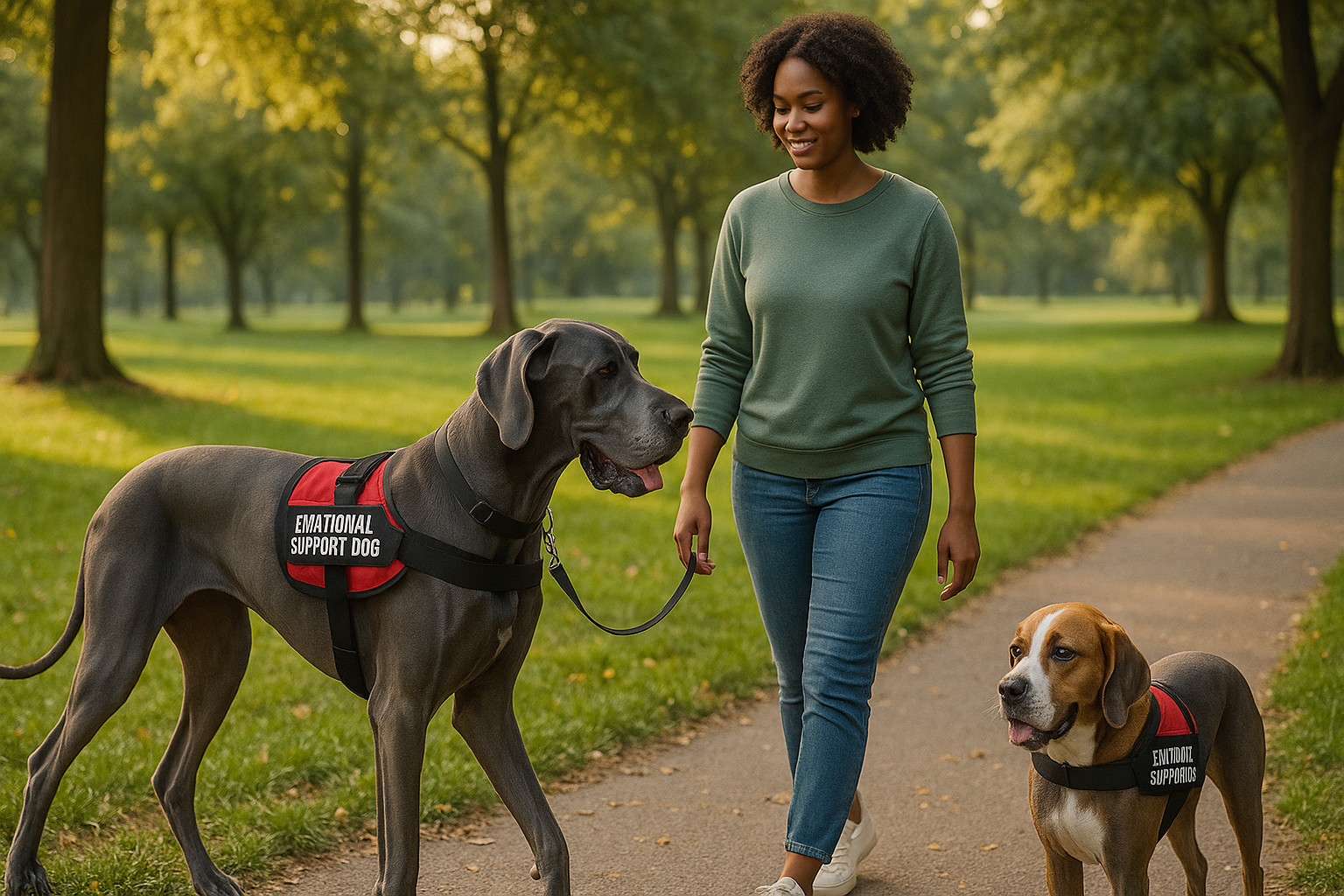Great Dane as an Emotional Support Dog
Get Your Documents

Creating a supportive environment is crucial for individuals in need of emotional support, and selecting the right companion can be transformative. Among the various breeds available, the Great Dane stands out as a unique and effective emotional support dog. This article delves into why Great Danes, with their empathetic nature and gentle demeanor, provide unparalleled emotional support.
Understanding the Emotional Support Role
In the realm of emotional support animals (ESAs), the primary role is to provide relief from symptoms of mental health conditions such as anxiety, depression, and PTSD. While not trained to perform specific tasks like service animals, ESAs offer comfort through companionship and presence. Let’s explore why the Great Dane excels in this role.
Great Dane Overview
Great Danes are often referred to as the “gentle giants” of the dog world, renowned for their towering stature and gentle temperament. Despite their imposing size, Great Danes are known for their affectionate and docile nature, making them well-suited for the emotional support role. Their regal yet approachable appearance often provides a comforting presence that is both reassuring and stabilizing.
Temperament and Emotional Connection
The temperament of a Great Dane aligns seamlessly with the requirements of an emotional support animal. They are inherently gentle and quiet, with a natural inclination towards forming deep bonds with humans. This breed is particularly adept at sensing emotional changes in their owners, often responding with calming and reassuring behaviors. Their unwavering loyalty and watchful vigilance make them incredibly intuitive companions that offer unwavering emotional support.
Adaptability and Daily Behavior
Great Danes are adaptable to various environments, provided they are given sufficient attention and care. Their moderate energy levels but large size mean they require regular walks and play, yet they are content to lounge around the house when you need rest. This balanced demeanor fosters an environment where the dog themselves manage stress and companionship harmoniously, allowing them to be present and responsive to their owner’s needs.
Situations Where Great Dane Provides Strong Support
Great Danes are particularly beneficial in scenarios where emotional steadiness is vital. They excel in providing:
- Comfort during momentary anxiety attacks.
- Reassurance and grounding when individuals feel overwhelmed.
- A consistent, calming influence during therapy or counseling sessions.
Their intuitive nature allows them to adjust their behavior based on the emotional needs of their human companion, offering silent support merely through their presence.
Ideal Living Environments
Ideal living environments for Great Danes vary but generally include:
- Spacious homes where they can move comfortably.
- Quiet, stable environments where stress factors are minimal.
- Family homes with multiple people they can interact with, fostering their social nature.
They can adapt to apartment living if exercised adequately, though homes with backyards offer a more suitable space for such a large breed to roam.
Bonds with Different Types of People
Great Danes are versatile in their ability to form bonds with different types of individuals. Their gentle nature makes them particularly suitable for families, but they are equally supportive to those living alone. They tend to form strong connections with children, being protective yet gentle, and are supportive companions for elderly individuals, offering steady, low-energy companionship.
Health, Care, and Wellbeing
The general health and care requirements of a Great Dane have important implications for their role as emotional support animals. Owners should be mindful of their needs to ensure they can offer the consistent support required.
Common Health Considerations
Great Danes are prone to certain breed-specific health issues, including:
- Hip dysplasia
- Gastric torsion (bloat)
- Heart disease
Regular veterinary check-ups, a balanced diet, and proper exercise are key to ensuring their wellbeing, which in turn supports their ability to provide consistent emotional support.
Grooming, Comfort, and Maintenance Needs
While their size is impressive, Great Danes are relatively low-maintenance in terms of grooming. Weekly brushing suffices to manage shedding, and their calm disposition often makes grooming a stress-free process. Maintaining their comfort involves ensuring they have a soft and supportive space to rest, and their social nature means they thrive best with ample human interaction.
Preparing a Great Dane for Emotional Support Work
Although Great Danes do not require specialized training for emotional support roles, preparation enhances their effectiveness. Proper socialization from a young age promotes their natural ability to adapt and remain calm in various situations.
Socialization and Responsiveness
Socializing a Great Dane involves exposure to different people, environments, and experiences. This promotes confidence and responsiveness, crucial traits for emotional support scenarios where adaptability to dynamic emotional states is essential.
Managing Stress and Emotional Cues
Great Danes possess a heightened ability to read and respond to human emotions. Owners can encourage this sensitivity by consistently rewarding calming behavior and gentle responses to emotional cues. Positive reinforcement, patience, and clear communication are key components for enhancing their natural empathic abilities.
Strengths, Challenges, and Ideal Homes for Great Dane
The strengths of a Great Dane as an emotional support dog lie in their innate empathy and loyalty. However, prospective owners must consider challenges including their size, health issues, and the space they require. Ideal homes are those that accommodate these needs, offering a stable and affectionate environment.
Final Thoughts
In summation, Great Danes are extraordinary candidates for emotional support work due to their affection, empathy, and calm demeanor. These gentle giants bring comfort and stability to those in need, proving time and again that they are more than just a towering presence—they are a steadfast emotional anchor.
Key Takeaways for the Great Dane as an Emotional Support Dog
- Best suited for: Individuals or families with ample space, those needing consistent companionship.
- Not ideal for: Small apartments, owners unable to manage their size and health care requirements.
- Emotional traits: Gentle, empathetic, loyal, and intuitive.
- Care and health notes: Regular exercise, vigilant health monitoring, and socialization needed.
- Environments where they provide the most comfort: Spacious living areas with consistent social interaction.
Get Your Documents
Example State Cards













